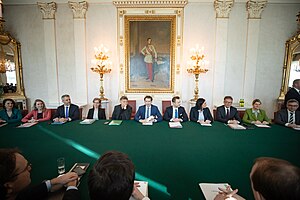
Back Druhá vláda Sebastiana Kurze Czech Bundesregierung Kurz II German Sebastian Kurzi teine valitsus Estonian Gouvernement Kurz II French Második Kurz-kormány Hungarian Governo Kurz II Italian Kabinet-Kurz II Dutch Drugi rząd Sebastiana Kurza Polish Vláda Rakúskej republiky od 7. januára 2020 do 11. októbra 2021 Slovak
| Second Kurz Government | |
|---|---|
33rd Cabinet of Austria | |
 | |
| Date formed | 7 January 2020 |
| Date dissolved | 11 October 2021 |
| People and organisations | |
| Appointed by | Alexander Van der Bellen |
| Chancellor | Sebastian Kurz |
| Vice-Chancellor | Werner Kogler |
| Member parties | People's Party The Greens |
| Status in legislature | Majority coalition |
| No. of ministers | 15 |
| Opposition parties | Social Democratic Party Freedom Party NEOS |
| Opposition leader | Pamela Rendi-Wagner |
| History | |
| Election(s) | 2019 legislative election |
| Predecessor | Bierlein government |
| Successor | Schallenberg government |
The Second Kurz government (German: Zweite Bundesregierung Kurz or Kurz II for short) was the 33rd Government of Austria. Led by Sebastian Kurz as chancellor and Werner Kogler as vice-chancellor, it was sworn in by President Alexander Van der Bellen on 7 January 2020. It was officially dissolved and succeeded by the Schallenberg government on 11 October 2021.[1]
This government represents many firsts. Headed by a former chancellor who had been ousted in a parliamentary vote of no confidence and made a comeback by winning the 2019 legislative election, it marks an alliance of a centre-right Austrian People's Party (ÖVP) with the centre-left The Greens as junior partner in the national government; it was the only such coalition in Europe until June 2020. It also features a majority of female cabinet members. Chancellor Kurz himself is the youngest member of his own government and the youngest chief executive of any of the European Union's member states for the second time. The new political alliance is closely watched in Europe, especially in neighbouring Germany, as it could become the prototype for a new type of politics in which ascendant conservatives make common cause with green parties to tackle climate change, which has become a salient concern of voters.
The Second Kurz government succeeded the Bierlein government, a nonpartisan caretaker administration installed on 3 June 2019 to run Austria following the collapse of the First Kurz government in the wake of the Ibiza affair involving its coalition partner, the far-right Freedom Party (FPÖ). The termination of the coalition of Kurz's party with the FPÖ was followed by a vote of no confidence in Parliament and snap election in which voter support for the FPÖ dropped sharply and support for the Greens surged to nearly 14%, its highest level ever. The ÖVP emerged victorious with 37% of the popular vote. Although the ÖVP won the election, it did not achieve a parliamentary majority in the National Council and therefore had to look for a junior coalition partner.
- ^ "AVISO: Morgen, 13:00 Uhr: Ernennung und Angelobung von Bundeskanzler Alexander Schallenberg durch Bundespräsident Alexander Van der Bellen". ots.at (in German). 10 October 2021. Retrieved 10 October 2021.
© MMXXIII Rich X Search. We shall prevail. All rights reserved. Rich X Search